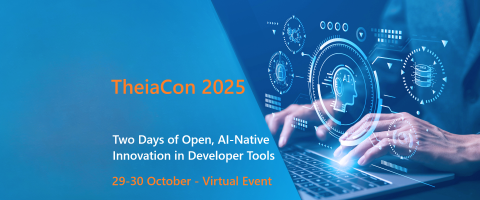TheiaCon 2025 is almost here: our two-day online conference (29–30 October, 16:00–19:00 CET) fully dedicated to the Eclipse Theia ecosystem and to the future of AI-native, cloud-based, open developer tools.
This year’s agenda is packed with technical depth, innovation, and real-world stories from across the community. Whether you’re building IDEs, domain-specific tools, or integrating AI into your dev workflows, you’ll find a lot to learn and be inspired by.

Let’s take a quick tour through what’s coming 👇
Day 1 (Oct 29th) – Foundations, Collaboration, and AI-native Evolution
We kick off with Jonas Helming and the Eclipse Theia Project Update 2025 (16:00 CET). A yearly milestone session that walks through everything new in Theia: from Theia AI reaching stability to the Model Context Protocol (MCP) integration, compatibility improvements, and the Lumino migration. If you want the big picture of where Theia stands and where it’s heading, this is where to start.
Then Miro Spönemann explores collaboration beyond IDE boundaries in Collaborative Editing Across Web Applications and Theia-based IDEs (16:30 CET). A fascinating look at how Eclipse Open Collaboration Tools (OCT) connects Theia with any web application, making live shared editing a first-class feature for everyone involved: developers, product owners, and domain experts alike.
Next, Harmen Wessels and Martin Fleck present Shifting Perspectives: Unified Textual, Graphical, and Form-Based Data Modelling with CrossModel (17:00 CET). A technically elegant approach to synchronising textual DSLs and diagrams via a shared logical model: powered by Langium and GLSP. This is what modern model-driven tooling looks like.
One of the most anticipated talks follows at 17:30 CET: Philip Langer with A Native IDE for Claude Code: Deeply Integrating AI Agents with Theia. This demo generated thousands of views when it was first previewed: and now it’s fully integrated into the project (see the video)! It shows how Theia’s open architecture enables deep AI agent integration, with Claude Code becoming truly IDE-native: context-aware, visually interactive, and seamlessly embedded.
At 18:00 CET, Thomas Mäder asks Theia RCP, What’s the Holdup? A question many long-time Eclipse #RCP adopters will relate to. A concise, honest look at the path from RCP to Theia, and what still stands between legacy desktop tooling and fully modern, web-based IDEs.
Finally, I’ll take the stage myself at 18:15 CET with Building AI-native Development Environments with Eclipse Theia and Theia AI. (A bit selfish to highlight my own session, I know 😅 but I do encourage you to stay a bit late!) We’ll talk about what it really means to build AI-native, open source development environments, and how teams can leverage AI responsibly, keeping control over their tools, models, and data.
Day 2 (Oct 30th) – Innovation, Architecture, and Trust
Day 2 opens again with Jonas Helming in Beyond Coding: The Ultimate AI-Native IDE Demo with Theia AI (16:00 CET). It’s a full end-to-end demonstration of Theia AI, one year after its initial release, showing what “AI-native” really looks like when you can shape, orchestrate, and extend every agent, workflow, and interaction.
Then Vivien Jovet takes us inside Martini Designer (16:30 CET): an enterprise-grade, AI-powered IDE built on Theia that blends low-code tooling, full-code editing, and intelligent workflows. It’s a strong example of how organisations can use Theia’s extensibility to meet enterprise requirements like security, performance, and maintainability, while still embracing innovation.
At 17:00 CET, Mark Sujew goes deep into Notebook Internals in Theia, unpacking the architecture behind notebook support, from widgets and webviews to plugin coordination. A must-see for anyone building extensions or complex integrations on Theia’s framework.
The next lightning talks focus on trust, transparency, and autonomy. Jeronimo Ortiz explains why Snippet-level scanning has become critical (17:30 CET), highlighting TheiaIDE’s integration with osskb.org to detect code plagiarism and reinforce open source integrity.
Then Dr. Stefan Winkler in Self-Brewed Beer is (almost) Free (17:45 CET) shares hands-on lessons from running Ollama locally as a Theia AI backend, for those who prefer not to rely on hosted AI providers.
Finally, Matthew Khouzam closes the day with Exploring the Cache Effect (18:00 CET), a practical demonstration of the trace viewer plugin and a reflection on how KPIs can mislead performance analysis — a great example of Theia’s power beyond classic coding use cases.
🎯 None of this would be possible without the excellent work of the Program Committee: thank you to Jonas Helming, Mark Sujew, and Mark Goodchild for curating such a diverse and technically rich agenda.
💡 Whether you are building AI-native tools, modernising an IDE, or exploring open source extensibility: TheiaCon is the place to connect with the community shaping the next generation of developer tools.
29–30 October 2025, 🕓 16:00–19:00 CET / 10:00–13:00 EST
🌐 This is a free online event — open to everyone.
➡️ Check out the full agenda and register here: https://www.eclipse.org/events/2025/theiacon/
Thomas Froment, Program Manager, Development Tools at the Eclipse Foundation
PS: You can also try Eclipse Theia yourself — desktop or browser, including Theia AI — at https://theia-ide.org/
